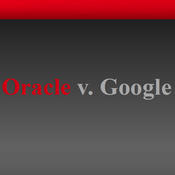
(click image for larger view and for slideshow)
After deliberating for more than three days, the jury tasked with determining whether Google’s Android operating system infringes Oracle’s intellectual property rights in Java remained undecided about the copyright claim as noon, Pacific Time, approached on Friday.
Oracle sued Google last year, alleging that Android infringed Oracle’s Java copyrights and patents. The trial began three weeks ago.
Oracle initially asked for $1 billion and an injunction to block the shipment of Android devices, but the potential damages–if Google isn’t exonerated–are now expected to be less than $100 million.
Based on questions that the jury posed to Judge William Alsup on Thursday, there was speculation that jury is leaning toward finding there was copyright infringement. But there’s evidently an impasse, which may indicate that at least some members of the jury are inclined to allow the infringement under the fair use doctrine.
Until the jury renders its verdict or declares that it cannot reach a unanimous decision, the outcome will remain uncertain. Judge Alsup on Friday indicated that he’s willing to accept a partial verdict, meaning that unresolved questions will have to be retried, if they haven’t been made moot by a judicial ruling.
[ For a legal precedent, read EU Court Says Computer Functions Not Copyrightable. ]
The primary issue that might be made moot is whether Oracle can even make a copyright claim. The judge has made clear that he reserves the right to rule on whether APIs can be copyrighted under the law. But presumably, he’d rather not if there are other means to resolve Oracle’s claim. If Google is found not to have infringed, he doesn’t need to rule on the copyrightability of APIs. If Google is found to have infringed, but to have done so as permitted under the fair use doctrine, he also doesn’t need to rule on whether APIs can be protected.
However, if the jury finds that Google infringed and that Google’s actions don’t qualify as fair use, then the copyrightability of APIs comes into play. Google’s position is that APIs, like computer languages, cannot be copyrighted; Oracle disagrees.
Google’s counsel, Robert Van Nest, on Thursday made it clear that that he objected to a partial verdict, noting that lack of unanimity should result in a mistrial. A partial verdict could harm Google’s case: If infringement is affirmed but fair use remains undetermined, Google’s prematurely assumed guilt might influence the forthcoming patent phase of the trial.
Chances are Judge Alsup is aware that a partial verdict is arguably prejudicial and if he’s considering a partial verdict, it could indicate his willingness to fill in the gap by ruling on the copyrightability of APIs. Earlier in the trial, the judge indicated that he might rule on whether APIs can be copyrighted.
On Thursday, that very question was resolved in Europe: The Court of Justice of the European Union ruled in a similar case, SAS Institute Inc. v. World Programming Ltd, that neither the functionality of computer program nor the format of its data files are expressive enough to merit copyright protection.
Judge Alsup asked Google’s and Oracle’s attorneys to file briefs on the question of API copyrightability by May 10, making reference to the EU court ruling.
Tyler Ochoa, a professor with the High-Tech Law Institute at Santa Clara University, said in a phone interview that Oracle has conceded that the Java programming language is not copyrighted, but claims the APIs. “Most of the programmers I’ve talked to think that the APIs are an integral part of Java,” he said. Ochoa expressed skepticism that the Java language could be free to use while the instructions for using the language–the APIs–could be protected.
Ochoa also believes that the judge made a mistake in his jury instructions–specifically, item 30–by stating that Google had to obtain written permission from Sun or Oracle to use the copyrighted Java APIs.
“That’s simply not true,” he stated, noting that written permission is required only for an exclusive license and that a non-exclusive license can be conveyed verbally. Google has argued that Sun CEO Jonathan Schwartz’s endorsement of Android amounted to just such a license.
“If you’ve promised someone you can use something, you’ve given them a license,” Ochoa said, adding that the license may be irrevocable if the party relied on that promise and made investments based on it. The evidence Google presented that Sun knew what it was doing with Android should be enough to qualify as an implicit license, according to Ochoa.
InformationWeek is conducting a survey to get a baseline look at where enterprises stand on their IPv6 deployments, with a focus on problem areas, including security, training, budget, and readiness. Upon completion of our survey, you will be eligible to enter a drawing to receive an 16-GB Apple iPad. Take our InformationWeek IPv6 Survey now. Survey ends May 11.
